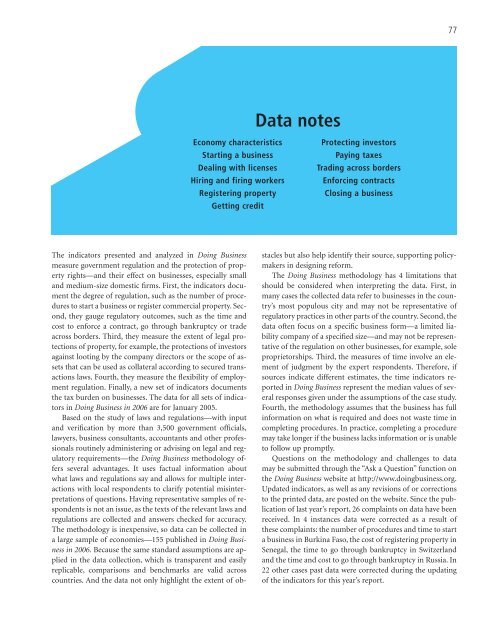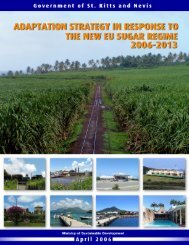Creating
Doing Business in 2006 -- Creating Jobs - Caribbean Elections
Doing Business in 2006 -- Creating Jobs - Caribbean Elections
You also want an ePaper? Increase the reach of your titles
YUMPU automatically turns print PDFs into web optimized ePapers that Google loves.
77<br />
Data notes<br />
Economy characteristics<br />
Starting a business<br />
Dealing with licenses<br />
Hiring and firing workers<br />
Registering property<br />
Getting credit<br />
Protecting investors<br />
Paying taxes<br />
Trading across borders<br />
Enforcing contracts<br />
Closing a business<br />
The indicators presented and analyzed in Doing Business<br />
measure government regulation and the protection of property<br />
rights—and their effect on businesses, especially small<br />
and medium-size domestic firms. First, the indicators document<br />
the degree of regulation, such as the number of procedures<br />
to start a business or register commercial property. Second,<br />
they gauge regulatory outcomes, such as the time and<br />
cost to enforce a contract, go through bankruptcy or trade<br />
across borders. Third, they measure the extent of legal protections<br />
of property, for example, the protections of investors<br />
against looting by the company directors or the scope of assets<br />
that can be used as collateral according to secured transactions<br />
laws. Fourth, they measure the flexibility of employment<br />
regulation. Finally, a new set of indicators documents<br />
the tax burden on businesses. The data for all sets of indicators<br />
in Doing Business in 2006 are for January 2005.<br />
Based on the study of laws and regulations—with input<br />
and verification by more than 3,500 government officials,<br />
lawyers, business consultants, accountants and other professionals<br />
routinely administering or advising on legal and regulatory<br />
requirements—the Doing Business methodology offers<br />
several advantages. It uses factual information about<br />
what laws and regulations say and allows for multiple interactions<br />
with local respondents to clarify potential misinterpretations<br />
of questions. Having representative samples of respondents<br />
is not an issue, as the texts of the relevant laws and<br />
regulations are collected and answers checked for accuracy.<br />
The methodology is inexpensive, so data can be collected in<br />
a large sample of economies—155 published in Doing Business<br />
in 2006. Because the same standard assumptions are applied<br />
in the data collection, which is transparent and easily<br />
replicable, comparisons and benchmarks are valid across<br />
countries. And the data not only highlight the extent of obstacles<br />
but also help identify their source, supporting policymakers<br />
in designing reform.<br />
The Doing Business methodology has 4 limitations that<br />
should be considered when interpreting the data. First, in<br />
many cases the collected data refer to businesses in the country’s<br />
most populous city and may not be representative of<br />
regulatory practices in other parts of the country. Second, the<br />
data often focus on a specific business form—a limited liability<br />
company of a specified size—and may not be representative<br />
of the regulation on other businesses, for example, sole<br />
proprietorships. Third, the measures of time involve an element<br />
of judgment by the expert respondents. Therefore, if<br />
sources indicate different estimates, the time indicators reported<br />
in Doing Business represent the median values of several<br />
responses given under the assumptions of the case study.<br />
Fourth, the methodology assumes that the business has full<br />
information on what is required and does not waste time in<br />
completing procedures. In practice, completing a procedure<br />
may take longer if the business lacks information or is unable<br />
to follow up promptly.<br />
Questions on the methodology and challenges to data<br />
may be submitted through the “Ask a Question” function on<br />
the Doing Business website at http://www.doingbusiness.org.<br />
Updated indicators, as well as any revisions of or corrections<br />
to the printed data, are posted on the website. Since the publication<br />
of last year’s report, 26 complaints on data have been<br />
received. In 4 instances data were corrected as a result of<br />
these complaints: the number of procedures and time to start<br />
a business in Burkina Faso, the cost of registering property in<br />
Senegal, the time to go through bankruptcy in Switzerland<br />
and the time and cost to go through bankruptcy in Russia. In<br />
22 other cases past data were corrected during the updating<br />
of the indicators for this year’s report.

















